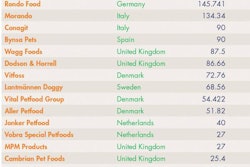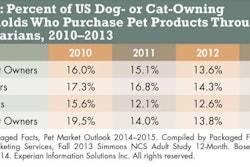As yet another US state considers mandating labeling of food products with information on ingredients that have been genetically modified (otherwise known as GMOs), a new paper looks at the potential impact – positive and negative – of such mandates.
The latest state jumping into the GMO labeling debate is Vermont. Its legislature recently passed a bill that would make it the first state to require mandatory labeling of any foods containing ingredients that had been “genetically engineered.” The governor is expected to soon sign it into law.
Note that this bill – similar to ones previously passed in Connecticut and Maine, in addition to ones introduced in California and other states – specifically covers products for human consumption, not petfood. Yet with previous state referendums on GMO labeling mandates being rather confusing and unclear as to whether they included products for animal consumption, it makes sense for our industry to pay attention to these new legislative initiatives.
And to check out the paper from the Council for Agricultural Science and Technology, “The Potential Impacts of Mandatory Labeling for Genetically Engineered (GE) Food in the United States.” Authored by a diverse group of researchers, the paper examines arguments for and against mandatory GMO labeling, the costs involved with labeling and experiences in countries that use mandatory labeling.
After studying public opinion polls, consumer choice and interpretations that support both sides of the debate, right-to-know issues, food safety and testing, and legal and economic issues, the researchers concluded that there is “no science-based reason to single out GE foods and feeds for mandatory process-based labeling” and that such labeling would increase food costs in the US. (If you don’t have time to read the entire paper, all the researchers’ conclusions are summarized on page 2.)
Whether or not you agree with these conclusions, it’s difficult to argue with the authors’ call for better communication on the subject: “Independent objective information on the scientific issues and the possible legal and economic consequences of mandatory GE food labels needs to be provided to legislators and consumers, especially in states with labeling initiatives on the ballot, to help move the national discussion from one of contentious claims to a more fact-based and informed dialog.”
Amen to that. Previous ballot referendums on mandatory GMO labeling – one in Washington state last year and another in California in 2012 (different from the current legislative bill being considered in California) – engendered large, expensive campaigns that only caused more confusion and hysteria.
The state laws currently being considered or passed don’t seem much better in terms of the debate surrounding them. For example, the Grocery Manufacturers Association (GMA) deemed the new Vermont law “critically flawed and bad for consumers,” while the Vermont Public Interest Research Group called it a “model that rest of the country can look to moving forward,” according to Food Safety News. The truth is probably somewhere in between.
GMA and other organizations, including petfood and feed related ones like the Pet Food Institute and American Feed Industry Association, believe federal legislation is a better solution. Perhaps they’re right – but only if that effort is accompanied by much better, fact- and science-based information and communication.



















